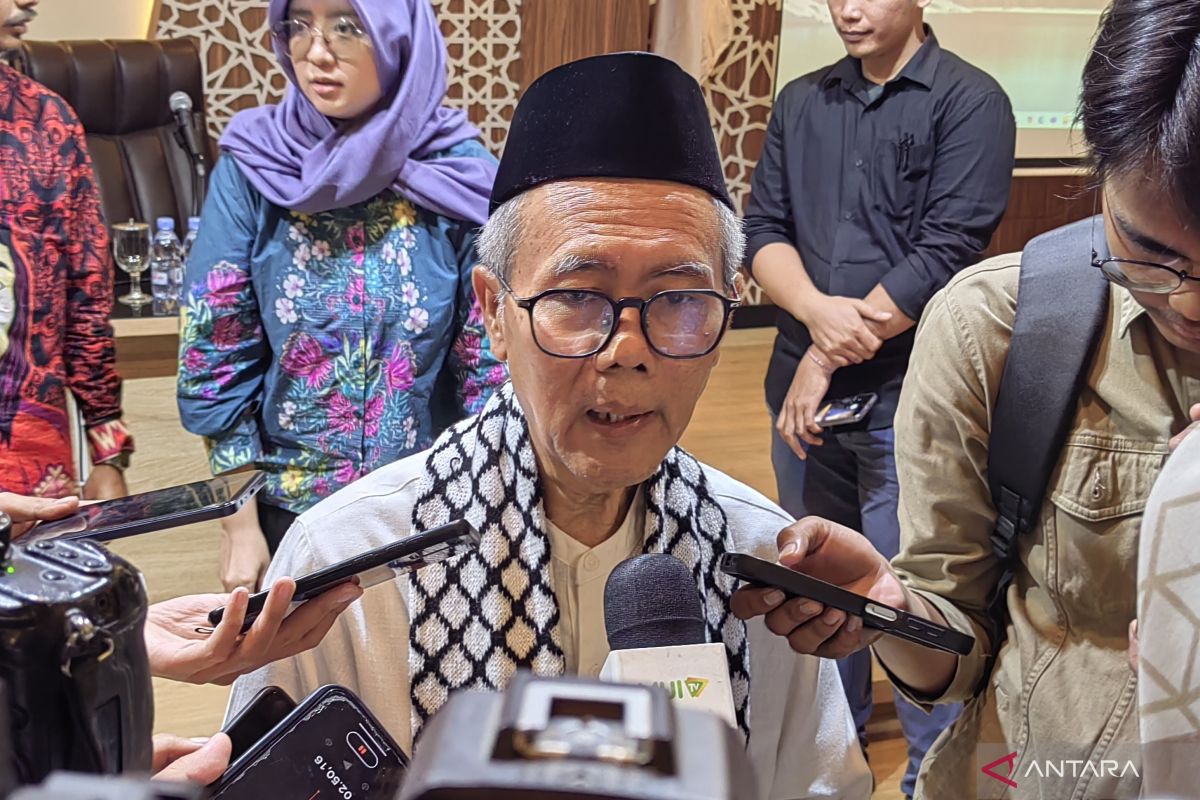Indonesia Grapples with Gaza Evacuation Plan Amidst Concerns of Displacement
By Archyde News service | April 14, 2025
Indonesia’s proposal to temporarily evacuate 1,000 Palestinians from Gaza for medical treatment and shelter faces scrutiny from religious leaders and activists fearing it could inadvertently support displacement efforts. Teh debate highlights the complexities of humanitarian aid in conflict zones and echoes similar concerns raised in the U.S. regarding refugee resettlement programs.
Indonesia Ulema Council Urges Reconsideration of gaza Evacuation Plan
The Indonesian Ulema Council (MUI), a prominent Islamic institution, has called on the Indonesian government to carefully consider its plan to evacuate 1,000 Palestinians affected by the ongoing conflict in Gaza to Indonesia. The proposal, initially put forth by President Prabowo Subianto, has stirred debate within Indonesia, prompting concerns about its potential impact on the Palestinian cause.
Mr. President has proposed an evacuation, which has sparked controversy that could lead to divisions if left unaddressed.Sudarnoto Abdul Hakim, MUI’s Head of Foreign Affairs and International Cooperation
Sudarnoto Abdul Hakim, Head of Foreign Affairs and International Cooperation for the MUI, stated on Monday in Jakarta that the organization views the plan as potentially counterproductive to the Palestinian struggle for independence. The MUI believes that Indonesia should prioritize pressuring Israel to end what they describe as “genocidal acts” rather than relocating Palestinians from their homeland. This sentiment mirrors debates in the U.S., where some question whether humanitarian aid inadvertently prolongs conflicts or undermines local sovereignty, as seen in discussions surrounding aid to various nations in the Middle East and elsewhere.
Hakim further emphasized the potential difficulties in ensuring the evacuees’ eventual return to Gaza, a concern that resonates with experiences from othre international relocation efforts. For example, the resettlement of refugees from war-torn countries in the U.S. frequently enough faces challenges related to integration, language barriers, and economic self-sufficiency.
For these reasons, we find it essential to communicate our stance to the president and ask him to study this evacuation plan more thoroughly.Sudarnoto Abdul Hakim, MUI’s Head of Foreign Affairs and international Cooperation
The MUI plans to meet with President Prabowo to discuss public recommendations regarding the Palestinian issue, underscoring the importance of engaging with diverse perspectives in shaping foreign policy.This process is similar to how advocacy groups in the U.S. engage with lawmakers to influence policy decisions on issues ranging from immigration to international trade.
We hope that the Indonesian government and public will remain steadfast in their commitment to fighting for the Palestinian nation.Sudarnoto Abdul Hakim, MUI’s Head of Foreign Affairs and International Cooperation
Concerns Over Alignment with Israeli Objectives
muhammad Husein, an Indonesian activist who previously resided in Gaza, echoed the MUI’s concerns, arguing that relocating Gazans could worsen the situation. He believes that the plan, despite its good intentions, could inadvertently align with Israel’s alleged goal of expelling Gazans from their homeland. This perspective aligns with arguments made by some critics of U.S. foreign policy, who contend that certain aid programs can unintentionally support the agendas of foreign governments.
President Prabowo Affirms Readiness to Evacuate
Earlier, on April 9, President Prabowo stated indonesia’s willingness to evacuate Palestinians from Gaza, saying: Indonesia is ready to deploy aircraft to evacuate approximately 1,000 residents in the initial phase.
He made this announcement before departing for the United Arab Emirates from Halim Perdanakusuma Airport in Jakarta.
President Prabowo clarified that the evacuees would not become permanent residents of Indonesia but would return to Gaza once the situation stabilizes. This assurance aims to alleviate concerns about long-term demographic shifts and potential strain on Indonesian resources. The U.S.has faced similar debates regarding the temporary protected status (TPS) granted to immigrants from countries facing natural disasters or armed conflict, with questions arising about the long-term implications for both the immigrants and the U.S.
Clarification from the Foreign Affairs Minister
Foreign Affairs Minister Sugiono corroborated President Prabowo’s statement,emphasizing that the mission’s sole purpose is to provide medical treatment and temporary shelter to Palestinians. Minister Sugiono clarified in a statement released the following day to reiterate Indonesia’s opposition to any attempts to displace the people of Gaza from their homeland.
points of View: possible solutions.
While Indonesia’s proposal to evacuate Palestinians from Gaza has sparked debate, here’s an HTML table using WordPress classes with possible solutions that can enhance the existing plan:
| Issue | Possible Solutions | implementation | Impact |
|---|---|---|---|
| Concerns of permanent Displacement | Implement a legally binding agreement ensuring the return of evacuees once Gaza is safe. | Work with international legal experts to draft and enforce the agreement. | Assures evacuees and the international community of the temporary nature of the evacuation. |
| Potential Strain on indonesian resources. | Seek international funding and support for the evacuation and care of evacuees. | Partner with international organizations such as the UN and WHO for financial and logistical assistance. | reduces the burden on Indonesian resources and promotes international collaboration. |
| Psychological Well-being of Evacuees | Provide thorough psychological support and trauma counseling for evacuees. | Establish mental health clinics and support groups staffed by trained professionals. | Addresses the psychological trauma experienced by evacuees and promotes their healing. |
| Ensuring Self-Sufficiency | Offer vocational training and educational programs to evacuees during their stay in Indonesia. | Partner with local educational institutions and businesses to provide training and job opportunities. | Equips evacuees with skills and knowledge to support themselves and contribute to the community. |
Considering Dr. Rahman’s emphasis on international humanitarian law,how can Indonesia ensure that the evacuation adheres to the principle of non-refoulement,notably regarding the Palestinians’ right to return?
Interview: Navigating the Gaza Evacuation Plan: A Conversation with Dr. Aisyah Rahman
Archyde News recently sat down with Dr. Aisyah Rahman, a specialist in international humanitarian law and a key figure at the Institute for Strategic Humanitarian Research (ISHR), to discuss the complexities surrounding Indonesia’s proposal to evacuate palestinians from Gaza. Dr. Rahman offers a unique outlook on the legal and ethical considerations of the plan, highlighting the challenges and potential pitfalls.
Understanding the Evacuation Proposal
Archyde News: Dr. Rahman, thank you for joining us. Can you provide a brief overview of the Indonesian government’s evacuation plan and the key concerns it’s generating?
Dr. Rahman: Thank you for having me. Indonesia’s plan,initiated by President Prabowo Subianto,aims to evacuate approximately 1,000 Palestinians from Gaza for medical treatment and temporary shelter. The primary concern, as highlighted by the Indonesian Ulema Council and other groups, is the potential for this to inadvertently facilitate displacement, going against the Palestinian people’s right to remain in their homeland. There are also questions around the practicalities of safeguarding evacuees’ rights and ensuring safe return.
Legal and Ethical Considerations
Archyde News: From a humanitarian law perspective, what are the critical aspects that need careful consideration in such an evacuation?
Dr.Rahman: The core principle is non-refoulement – the prohibition of returning someone to a place where they face threats to their life or freedom. Ensuring a clear legal framework guaranteeing the right to return is paramount.We need robust mechanisms for the evacuees’ repatriation and measures addressing their integration into Indonesian life temporarily. It is crucial to avoid perceptions of contributing to the ongoing conflict or any actions that could be perceived as “ethnic cleansing.” International law, including the Geneva Conventions, also guides how to best protect civilians during conflict and during any evacuation.
Archyde News: Some critics argue that such evacuations could be seen as aligning with the objectives of certain parties in the conflict. How can the plan be designed to avoid such perceptions?
Dr. Rahman: Clarity is key. The Indonesian government must openly communicate its intentions, emphasizing its commitment to the sovereignty of the Palestinian people and their right to return. Independent monitoring by international bodies, such as the UN, can further solidify the neutrality of the operation. moreover, the plan must be carefully aligned with the broader humanitarian objectives; this needs to be very thoughtful.
Addressing Practical Challenges
Archyde News: The article mentions potential strains on Indonesian resources. Beyond international funding, what concrete steps can be taken to mitigate such challenges?
Dr. Rahman: Collaboration is essential. indonesia could partner with established international aid organizations and humanitarian agencies.These organizations possess the experience and infrastructure, to include medical and psychological support during and after the evacuation. Vocational training and access to temporary employment,as the article notes,could enhance the success of evacuees’ eventual return. The need is for all to remain involved and active.
Potential Solutions and Future Outlook
Archyde News: The table of possible solutions provided some good, and practical solutions. How do you feel about the solutions for the concerns mentioned in the article?
Dr. Rahman: I think the article touched on some very useful ideas, such as legally binding agreements about a safe return and the need for international funding to support those evacuated. Those types of concrete and well-thought-out points can help give the plan greater weight and trust with the international community. These types of steps, combined with those discussed earlier about transparency, can create more hope for the Palestinians and the evacuation itself.
Archyde News: Dr. Rahman, what is your outlook on the potential long-term impact of Indonesia’s involvement in this humanitarian crisis?
Dr. Rahman: Indonesia has long stood in support of Palestine. It is vital that these efforts align with international humanitarian law and the principles of justice. The success is defined, first, by the well-being of those evacuated. The plan should be regarded as a short-term solution to address the immediate need for medical treatment, but the success of the whole process will be very much dependent on the right of the Palestinians to safely return to their homeland. Indonesia’s approach could set an example for how other nations can address humanitarian crises in conflict settings.
Archyde News: Dr. Rahman, thank you for your insights.
Dr. Rahman: Thank you for having me.
Readers, what additional measures do you think are essential to ensure the prosperous and ethical implementation of the Gaza evacuation plan? Share your thoughts in the comments below.








